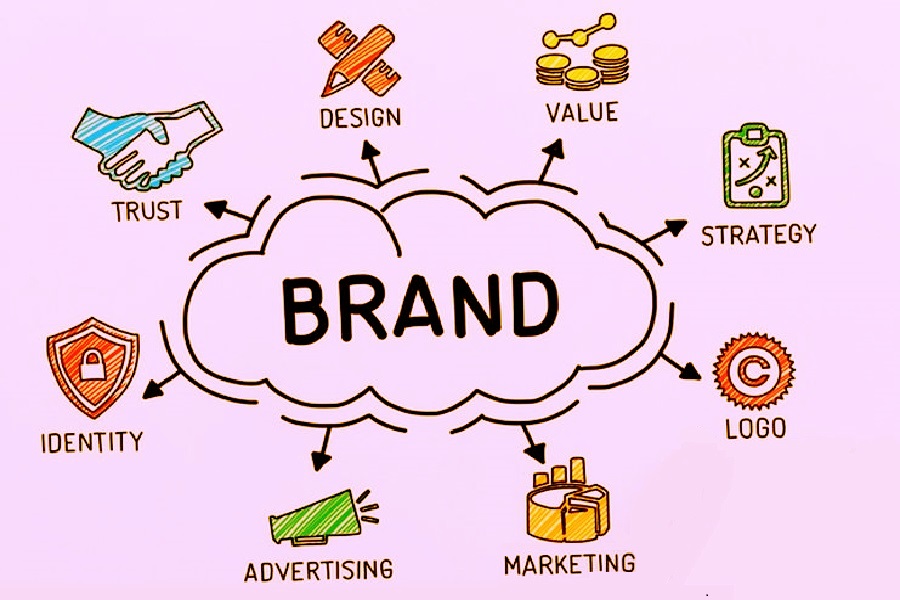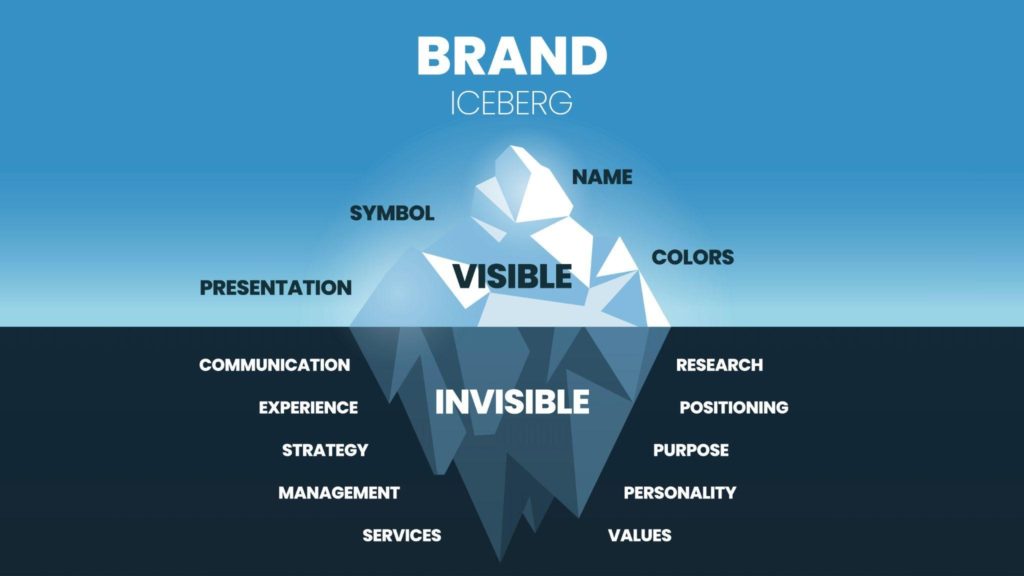
The words humble, jubilant, profound, charming, and provocative, commonly used to describe personality traits, can also aptly describe brand personalities. Brand personalities can charm, irritate, inspire, or repel like individuals. A well-defined and robust character humanizes the brand, setting it apart and making it relatable in today’s crowded marketplace. A brand personality creates a lasting impression on consumers by evoking specific emotions and values, forging a deeper connection, and fostering brand loyalty.
Introduction
Fun fact: Did you know a well-developed brand personality can attract customers and foster brand loyalty and advocacy?
According to a study by Forbes, 64% of consumers have said that shared values are the primary reason they have a strong relationship with a brand. This highlights the power of brand personality in establishing emotional connections with customers.
By creating a brand personality that resonates with your target audience, you can develop a sense of affinity and loyalty beyond product features and price points. A strong brand personality can make your business stand out in a crowded marketplace, cultivate a tribe of loyal customers, and even attract brand collaborations and partnerships. So, investing time and effort into creating a unique and compelling brand personality can significantly impact your business’s success and growth.
Creating a unique brand personality is crucial for any business looking to make a lasting impact in the marketplace. In this step-by-step guide, we will explore how to create brand personality that sets your company apart and resonates with your target audience. From understanding the importance of brand personality to defining your brand values and crafting a consistent brand voice, we will delve into the key strategies and practical steps to develop a compelling and authentic brand personality. This guide will give you the insights and tools to establish a strong brand identity that connects with your customers and drives long-term success.
What is Brand Personality?
Brand personality encompasses the traits, characteristics, and core values that define a brand. It represents the essence and soul of a brand, evoking specific emotions and connections in the minds of people who think about it or engage with its products and services.
Consider well-known brands like Coca-Cola, Red Bull, Harley Davidson, Jeep, Microsoft, Apple, Disney, FOX, Nike, and Adidas. Each of these brands possesses a unique personality that is difficult to describe but leaves a lasting impression on consumers.
The brand personality consists of a combination of attributes, emotions, and behaviors that a brand communicates to its customers, contributing to its distinctive identity and setting it apart from competitors. This is what makes brand personality such a potent force.
In today’s society, emotions hold significant power in entrepreneurship, and brand personality leverages this power effectively.
Brand personality is often conveyed through the use of personality traits. For example, a brand may emphasize an outdoorsy and down-to-earth persona to appeal to individuals who appreciate ruggedness and resilience in a brand.
By incorporating these traits, a brand can establish a consistent and recognizable image that resonates with its target audience.
Why is Brand Personality Important?
The journey of building a successful brand goes beyond monetary gains; it encompasses a multitude of other advantages. Many businesses that invest in developing authentic, attractive, and memorable brands reap the rewards such as increased engagement, enhanced influence, and the ability to attract other brands willing to pay for collaboration. These benefits are the key to achieving real prosperity in the business world, and you can achieve the same.
Brand affinity and its impact on the performance of advertising platforms like AdWords and Facebook ads are well recognized. However, harnessing the full potential of branding to strengthen your business requires careful thought, planning, and consistent effort. It is crucial to understand the concepts of brand personality and brand messaging, their significance, and how to shape them to create a lasting brand that guarantees long-term success. This post aims to cover these topics.
What is brand personality, and why should you prioritize it? In everyday life, we understand “personality” as a combination of distinctive characteristics and qualities that make individuals recognizable and appealing to others. The same applies to branding.
Every brand, just like every person, has its personality. Your brand’s personality influences how people perceive and interact with your business, just as an individual’s personality affects their relationships. It can make a difference between struggling to survive and achieving:
- Retaining loyal customers and turning them into brand advocates.
- Attracting a consistent stream of new customers.
- Establishing credibility and authority within your industry leads to more opportunities.
The significance of building a brand personality is often disregarded by many businesses, leading to branding that could be more exciting and exciting. As a result, these businesses are swiftly surpassed by competitors who have successfully formed an emotional bond with their audience right from the start.

Below are two expert approaches to establishing a brand personality that profoundly resonates with your audience. Utilize these as the basis for developing your brand!
The Components of Brand Personality
The Aaker five-dimensional model is the most widely used method for constructing a brand personality. Our model sports brands into five categories based on their primary traits: sincerity, excitement, competence, sophistication, and ruggedness.
The constituents of a brand personality:
Brands concentrate on one or two primary personality dimensions while balancing and complementing the others.
-
Sincerity
Sincere brands like Disney or Patagonia possess genuine, honest, and down-to-earth personalities. These traits are evident in their actions and marketing efforts.
Patagonia’s “Common Thread” initiative encourages conscious shopping to reduce clothing waste. The above advertisement urges customers not to purchase products unnecessarily, aligning with their sincere brand personality and purpose. As a result, Patagonia has fostered brand loyalty and resonated with environmentally-conscious outdoor enthusiasts.
-
Excitement
Some brands possess daring, exciting, and imaginative personalities. Nike, for instance, positions its brand to inspire movement, growth, and excitement in athletics.
Using celebrity athletes and inspirational messaging, Nike urges people to embrace a life of endless possibilities. Their famous slogan, “Just do it.” is simple and daring, appealing to individuals striving for continuous progress.
Other prominent brands like Redbull generate excitement by encouraging spontaneous actions among ordinary people. The brand resonates with those who seek or admire high-octane, adventurous lifestyles.
-
Competence
Brands based on a competent personality value their intelligence and dependability. They appreciate hard work and prioritize delivering high-quality products or services.
Google, for example, processes billions of web pages within seconds to provide users with the top 10 websites that answer their queries. This combination of reliability and intelligence has established Google as a trusted brand.
Volvo is another excellent example of a competent brand in the vehicle industry. It has built a reputation for being one of the safest car manufacturers, resonating with individuals who prioritizing reliability and safety.
Other industries, such as banking and software, often adopt a more severe and competent demeanor in their brand personalities.
-
Sophistication
Sophisticated brands possess charming and glamorous personalities that emphasize luxurious living. Brands like Rolex, Mercedes, and Chanel epitomize culture with their high-quality products crafted by respected designers.
These brands’ unique craftsmanship and high price points make them even more desirable to individuals who aspire to luxury and glamour.
-
Ruggedness
Rugged brands have a distinct appeal associated with outdoor activities, nonconformity, and durability. An example of such a brand is Jeep, which embodies the rugged brand personality and is well-known for its off-road adventures. This personality resonates with those who crave adventure and prefer the road less traveled.
Tip: If your brand aligns with multiple dimensions, choose a primary and a secondary size. For instance, When people think of Patagonia, they usually associate it with sincerity and ruggedness because of its high-quality outdoor products that withstand harsh conditions. Apple is known for its intelligent and reliable products that showcase its brand competence. At the same time, the company always impresses its customers with its innovative and exciting creations.

How to Develop Your Brand Personality
Understanding how to connect with each customer individually can be challenging, as there is no one-size-fits-all approach.
The crucial thing to remember is that your product or service attracts a diverse range of customers. Let this motivate you to develop and cultivate your brand, drawing in your audience even further.
Here are two expert approaches to creating a brand personality that resonates with your audience:
Identify your brand values.
Developing a strong mission statement or catchy tagline can aid in defining your business and distinguishing it from competitors.
A consistent theme across your brand messaging creates a sense of reliability and routine for customers who value those traits. This can be thought of as your brand archetype or foundation.
Consistency is also essential in developing your brand’s visual identity, which can be reflected through your logo design, color scheme, and typography.
Authenticity plays a crucial role in developing a brand personality. Avoid trying to be something you’re not or adopting a character that doesn’t align with your values. Consumers can easily spot inauthenticity, which can harm your brand’s reputation.
-
Gain inspiration from your audience
Your audience is attracted to your product or service, so let that inspire you to create content that deeply resonates with your target demographics. Additionally, actively seek feedback from your audience to understand what resonated with them and areas that need improvement. Often, buyers offer valuable insights and advice.
-
Envision your brand as a person
A person’s voice is a significant part of their identity. Similarly, your brand should have a distinct voice that aligns with its personality. Develop a consistent tone of voice for addressing your audience. This helps promote your brand experience and create a sense of familiarity and consistency.
Consistency should be maintained across all marketing channels, including your website, customer emails, and social media. Ensure your brand colors, voice, and personality remain consistent to maximize engagement and brand awareness.
-
Create a brand style guide
A brand style guide is a document that outlines guidelines for visually and verbally representing your brand across all platforms and communications. Regardless of the content creator, it ensures consistency in your brand’s messaging, tone, and visual identity.
This guide helps maintain a consistent and recognizable personality for years to come. Consistency fosters trust and familiarity with your audience, strengthening brand associations.
-
Conduct market research, adapt, and repeat
Your brand personality is not set in stone. As your business grows and evolves, your brand personality should adjust accordingly. It is essential to regularly assess how well your brand personality connects with your audience and make any needed changes. Strive for a balance between adaptability and branding consistency.
It’s essential to research and analyze the results of your marketing campaigns. Make tweaks to your brand communication to align with your desired personality. Repeat this process to refine your brand strategy further.
In addition, here are the five dimensions of brand personality:
1. Sincerity
Be authentic, warm, and genuine in your messaging, using real-life stories and examples that connect emotionally with your audience.
2. Excitement
Capture your audience’s enthusiasm through high-energy language, bold visuals, and dynamic messaging that conveys excitement. This pertains to your company’s identity.
3. Competence
Communicate your expertise and professionalism using concise language, backing up claims with data and facts, and employing a simplistic, modern graphics design.
4. Sophistication
Create a refined and elegant tone with a minimalist design aesthetic to convey a sense of luxury and exclusivity.
5. Ruggedness
Highlight toughness and durability through harsh tones and imagery, emphasizing your product or service’s practical benefits.
By understanding these dimensions, you can select the personality that best aligns with your brand and develop a brand strategy and guide that maintains consistency.
Brand Personality Examples
- Nike Nike’s marketing materials, such as their slogan “Just Do It” and mission statement, embody excitement, passion, and energy. Nike, as a person, represents a passionate sports fan, an avid athlete, and someone who values innovation and forward-thinking. Nike’s marketing strategy reflects this personality with colorful, fast-paced images and videos featuring Olympic athletes and active sports personalities.
- Chanel Chanel epitomizes sophistication in its brand personality. The brand’s mission statement emphasizes being the ultimate luxury house, defining style, and creating desire. Chanel, as a person, represents someone deeply passionate about fashion, highly polished, refined, and worldly. The brand’s Instagram page showcases a minimalist and vintage theme, using soft blues, light yellows, and black space to highlight focal points.
- REI REI has a rugged and outdoorsy brand personality. Their messaging focuses on celebrating the power of the individual and their love for the wild and natural places. As a person, REI is like an “Earthy-crunchy” friend who enjoys outdoor activities like camping, hiking, and swimming. The brand is dedicated to the environment and emphasizes sustainable products.
- Volvo’s brand personality is characterized by reliability, sturdiness, and dependability. The brand takes pride in its leadership in automotive safety and is known for its disciplined, responsible, and principled approach. As a person, Volvo represents someone who values safety above all else. Their marketing materials and messaging highlight the safety features of their cars and emphasize their commitment to making life easier, better, and safer with cutting-edge technology.
Understanding these brand personality examples clarifies how each brand strategically aligns its messaging and visual elements, reflecting its unique personality traits.
Conclusion
In conclusion, understanding what brand personality is and its significance is crucial in developing a successful branding strategy. Brand personality encompasses the traits, characteristics, and core values that define and differentiate a brand from competitors. By creating a brand personality that aligns with the target audience, brands can establish credibility, authority, and long-term success in the marketplace.
To establish a brand personality that connects with the audience., it is essential to identify brand values, establish consistency in messaging and visual identity, and prioritize authenticity. This involves developing a branding strategy and utilizing brand design techniques to convey the desired personality effectively.
Brand personality examples, such as Nike’s excitement and passion or Chanel’s sophistication, illustrate how brands strategically align their messaging and visual elements to reflect their unique personality traits. These examples showcase the power of a well-defined brand personality in attracting and engaging customers.
By incorporating brand personality into the overall branding strategy, including selecting appropriate traits and consistent implementation across marketing channels, brands can successfully differentiate themselves and forge a deep connection with their audience.
In summary, brand personality is integral to branding strategy and brand design. It plays a vital role in creating a lasting impression, fostering brand loyalty, and attracting new customers. By understanding brand personality, utilizing effective techniques to develop it, and aligning it with the target audience, brands can establish themselves as distinctive and influential players in the marketplace.
Short Bio:
At Kittl.com, Jenn Pereira works as a Content Strategist. This design platform provides various tools such as an AI image, logo generator, a t-shirt maker, and others. With her extensive experience, Jenn excels at comprehending the user experience and creating content strategies that cater to their requirements and meet their expectations.





